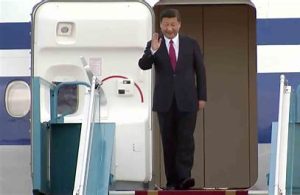Chinese President Xi Jinping has arrived in Vietnam for his first visit in six years, aiming to counter the growing influence of the United States in the region. This diplomatic move comes after Hanoi upgraded its ties with Washington during US President Joe Biden’s visit in September. Biden’s visit was part of broader US efforts to contain China’s economic power and secure crucial materials for high-tech manufacturing. As China and the US engage in strategic competition, Vietnam has adopted a “bamboo diplomacy” approach, seeking to maintain positive relations with both major powers.

The visit is significant as Vietnam shares US concerns about China’s assertiveness in the contested South China Sea. Despite these concerns, Vietnam has deep economic ties with China, and both countries are governed by communist parties. Currently holding a “comprehensive strategic partnership,” Vietnam’s diplomatic status with China is at its highest level. The visit also follows Vietnam’s elevation of its relationship with the US to a similar level in September, reflecting the nuanced diplomatic balancing act undertaken by Hanoi.
Chinese Foreign Ministry spokesman Wang Wenbin highlighted the agenda for Xi’s visit, which includes discussions on politics, security, practical cooperation, public opinion formation, multilateral issues, and maritime affairs. Xi may use this opportunity to advocate for Vietnam to join his “Community of Common Destiny,” a concept encompassing future cooperation on economic, security, and political matters. In an article published in Vietnam’s Nhan Dan newspaper, Xi emphasized that “Asia’s future is in the hands of no one but Asians,” reflecting China’s push for regional leadership.
Tensions are running high in the South China Sea, especially between China and the Philippines, with confrontations at disputed reefs. Vietnam, along with Malaysia, Brunei, and Taiwan, also has overlapping claims in the region. China’s extensive land reclamation projects in the South China Sea, resulting in militarized islands, have raised concerns among neighboring countries and prompted joint warnings against the “threat or use of force” by both Vietnam and the US during Biden’s visit.
The strategic competition between China and the US extends beyond territorial disputes. Both nations are seeking closer cooperation on rare earth minerals critical for advanced technology. Xi may explore opportunities for collaboration with Vietnam in this sector, mirroring recent initiatives between China Rare Earth Group Co. and Vietnam’s mining giant Vinacomin. This move aligns with global efforts to reduce reliance on China for essential resources, including semiconductors.
In this complex geopolitical landscape, Xi’s visit to Vietnam underscores China’s efforts to maintain regional influence and counterbalance the influence of the United States. The discussions during this visit may shape the trajectory of relations between China and Vietnam, impacting regional dynamics in Southeast Asia.
